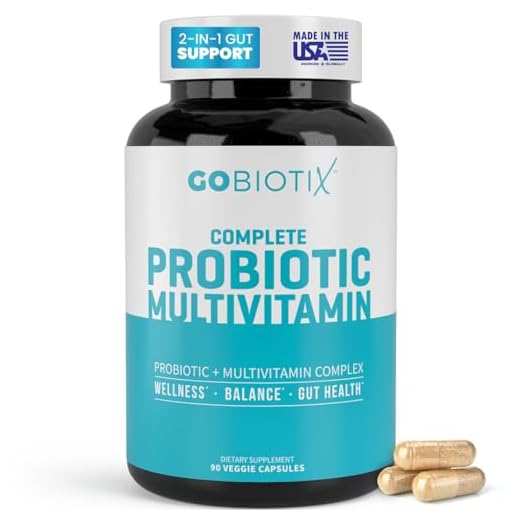







Yes, there are multivitamins specifically designed for digestive health. These supplements often include probiotics, which help restore gut bacteria balance, and digestive enzymes like amylase and protease that improve nutrient absorption. Essential vitamins such as D, magnesium, and zinc support gut function and overall health. Brands like Garden of Life and SmartyPants offer formulations that cater to digestive needs. When choosing a multivitamin, look for those rich in these key ingredients. By considering your personal health goals, you can find the right product to support your digestive wellness—more insights await you on how to optimize your selection.
Key Takeaways
- Many multivitamins specifically designed for digestive health contain probiotics to restore gut bacteria balance and enhance nutrient absorption.
- Formulations often include digestive enzymes that aid in breaking down food for better nutrient absorption and reduced discomfort.
- Key vitamins like D, magnesium, and zinc are included to support gut function and alleviate digestive discomfort symptoms.
- Brands like Garden of Life and SmartyPants offer multivitamins that combine essential nutrients with probiotics and fiber for digestive support.
- Choosing multivitamins with high bioavailability ensures effective absorption and maximizes the benefits for digestive health.
Benefits of Multivitamins for Digestion
When you consider your digestive health, multivitamins can play an important role in supporting gut function. These supplements often include vitamins for digestion, such as vitamin D, magnesium, and zinc, which are essential for maintaining gut health and reducing inflammation. Regular intake of multivitamins may also assist in regulating neurotransmitters that influence gut function, as key vitamins like B-complex promote overall body health. By filling nutritional gaps, multivitamins promote ideal nutrient absorption and enhance the function of your digestive system.
In addition to important vitamins, many formulations incorporate probiotics, which help balance gut microbiota. This balance is critical for overall digestive health outcomes, as beneficial bacteria support a well-functioning gut. Specific vitamins, like vitamin C, are known for boosting the production of beneficial gut bacteria, further enhancing digestive health.
Regular intake of multivitamins can alleviate symptoms of digestive discomfort, such as bloating and gas. They provide important nutrients that support digestive enzyme activity and maintain gut lining integrity. By integrating multivitamins into your routine, you not only support your digestive health but also promote a more comfortable and efficient gastrointestinal experience. Prioritizing these supplements can lead to significant improvements in your overall gut function and well-being.
Key Ingredients for Digestive Health
Revealing the secrets to digestive health often starts with understanding the key ingredients found in multivitamins. One essential component is probiotics, which help restore balance to your gut bacteria, enhancing nutrient absorption. Strains like Lactobacillus and Bifidobacterium are particularly beneficial for maintaining this balance. Additionally, specialized multivitamins may include key ingredients for stress relief, which can indirectly support digestive health by reducing stress-related digestive issues.
Digestive enzymes such as amylase, protease, and lipase also play an important role. They assist in breaking down food, improving nutrient absorption, and alleviating common issues like bloating and gas. Another significant ingredient is fiber, often sourced from prebiotics like inulin or psyllium husk. Fiber promotes regular bowel movements and nourishes beneficial gut bacteria, supporting overall digestive health.
Additionally, essential vitamins and minerals like Vitamin D and Zinc are included for their roles in maintaining intestinal cell strength and function, which is essential for reducing inflammation and promoting a healthy gut environment. Some multivitamins may even incorporate herbal extracts like ginger or peppermint, known for their anti-inflammatory properties and ability to soothe digestive discomfort. By focusing on these key ingredients, you can take meaningful steps towards better digestive health.
The Role of Probiotics
Probiotics play a fundamental role in digestive health by helping to restore and maintain the balance of your gut microbiome. These live microorganisms, primarily bacteria like Lactobacillus and Bifidobacterium, enhance gut health and nutrient absorption. By incorporating probiotics into your daily routine, especially through multivitamins designed for digestive health, you can support a healthy gut flora alongside essential vitamins and minerals.
Taking probiotics on an empty stomach, ideally 30 minutes before meals, maximizes their effectiveness. Regular intake can alleviate symptoms of digestive disorders, including irritable bowel syndrome (IBS) and antibiotic-associated diarrhea. This makes probiotics a valuable ally in managing digestive health.
In addition to multivitamins, consider consuming probiotic-rich foods like yogurt, kefir, and fermented vegetables to further enhance your gut microbiome. These food sources provide synergistic benefits, complementing your supplements for ideal digestive support. By focusing on probiotics, you can greatly improve your gut health, leading to better overall well-being. Remember, a balanced gut microbiome is essential not just for digestion but for your health as a whole.
Understanding Digestive Enzymes
Digestive enzymes are vital players in the process of breaking down food into smaller, more absorbable molecules. These supplements, commonly taken just before meals, enhance nutrient absorption and can greatly improve your overall health. They work by targeting specific macronutrients: amylase breaks down carbohydrates, protease handles proteins, and lipase focuses on fats.
Incorporating digestive enzymes into your regular diet may help alleviate digestive discomfort, relieving symptoms like bloating, gas, and constipation. When your body efficiently breaks down food, it not only aids digestion but also supports your immune function, as a healthier gut can lead to a more robust immune system.
While you might find digestive enzymes beneficial, it's important to consult a healthcare professional before starting any new regimen. They can provide guidance on appropriate dosages and help identify potential interactions with other supplements or medications you might be taking. Remember, individual needs vary, and professional advice guarantees you choose the right approach for your unique situation.
Nutrients Essential for Gut Health
Maintaining a healthy gut requires a variety of essential nutrients that work together to support digestion and overall well-being. Probiotics are critical, as they're live microorganisms that help balance gut microflora, alleviating issues like bloating and gas. Alongside them, prebiotics, often found in fiber-rich multivitamins, serve as food for these beneficial bacteria, promoting a thriving gut microbiome. Additionally, incorporating multivitamins for energy production can indirectly benefit gut health by ensuring the body has the necessary nutrients for peak function.
Vitamin D is another important nutrient for gut health. It helps regulate inflammation in the gastrointestinal system and supports immune function, with recommended levels at around 600 IU for adults. Magnesium plays a notable role as well, aiding in over 300 bodily functions, including promoting regular bowel movements and easing constipation. Magnesium citrate is often preferred for its absorption.
Don't overlook zinc, either. This essential mineral is key for maintaining intestinal cell strength and function, with a daily intake of 10 to 30 mg recommended to support gut integrity and prevent issues like leaky gut. By ensuring you get these critical vitamins and minerals, you can greatly enhance your digestive health and overall well-being.
How to Choose the Right Multivitamin
Selecting the right multivitamin can greatly impact your gut health and overall wellness. When searching for a multivitamin specifically for digestive health, prioritize formulations that include probiotics. These beneficial bacteria can enhance gut microbiome balance and improve digestive function.
Next, check for essential vitamins and minerals such as Vitamin D, Magnesium, and Zinc, which play significant roles in maintaining a healthy gut and promoting nutrient absorption. The form of the multivitamin—whether tablets, capsules, or gummies—should also align with your preferences and dietary restrictions to guarantee compliance.
It's important to pay attention to the recommended dose and bioavailability of the nutrients. Choose multivitamins that provide the recommended daily intake and are designed for maximum absorption, as this enhances the effectiveness of the vitamins.
Recommended Multivitamin Brands
Wondering which multivitamin brands can best support your digestive health? Several options stand out for their ability to enhance gut health through targeted ingredients.
Garden of Life Dr. Formulated Probiotics is a top choice, blending probiotics with essential vitamins and minerals to promote gut balance. If you're seeking a multivitamin with prebiotics, consider Ritual Essential for Women, which includes nutrients like magnesium and vitamin D that support digestion.
Another great option is SmartyPants Adult Formula, designed with digestive support in mind; it contains fiber and probiotics to enhance gut function while providing essential vitamins and minerals. For a whole-food approach, MegaFood Multi for Women includes beneficial herbs and probiotics aimed at promoting digestive health and overall nutrition.
Lastly, Nature Made Multi for Her focuses on women's health, incorporating vitamin D and zinc to maintain gut integrity and support immune function. These recommended multivitamin brands effectively combine probiotics, vitamins, and minerals to support gut health, making them excellent choices for anyone looking to enhance their digestive health.
Lifestyle Tips for Better Digestion
To support your digestive health effectively, adopting certain lifestyle habits can make a notable difference. Start by incorporating a high-fiber diet rich in fruits and vegetables, whole grains, and legumes. This not only improves digestive health but also promotes the growth of beneficial gut bacteria. Consider adding probiotics, whether through dietary supplements or fermented foods, to further boost your gut health.
Staying hydrated is essential too. Drink plenty of water throughout the day to aid digestion and prevent constipation, ensuring smooth bowel movements. Regular physical activity, like walking or yoga, enhances gut motility and can alleviate bloating and discomfort by stimulating the digestive process.
Prioritizing sleep and managing stress levels can also positively impact your gut. Techniques like meditation or deep-breathing exercises reduce inflammation and help maintain a balanced microbiome. Finally, limit processed foods and sugars, as these can disrupt the balance of gut bacteria and contribute to digestive issues like bloating and gas. By following these lifestyle tips, you can greatly enhance your digestive health and overall well-being.
Conclusion
Incorporating a multivitamin designed for digestive health can greatly enhance your gut function. For instance, Sarah, who struggled with bloating and irregular digestion, found relief after taking a multivitamin rich in probiotics and digestive enzymes. By choosing a product that aligns with your specific needs, you can support your digestive system effectively. Remember, pairing these multivitamins with a balanced diet and healthy lifestyle is key to achieving ideal gut health.





